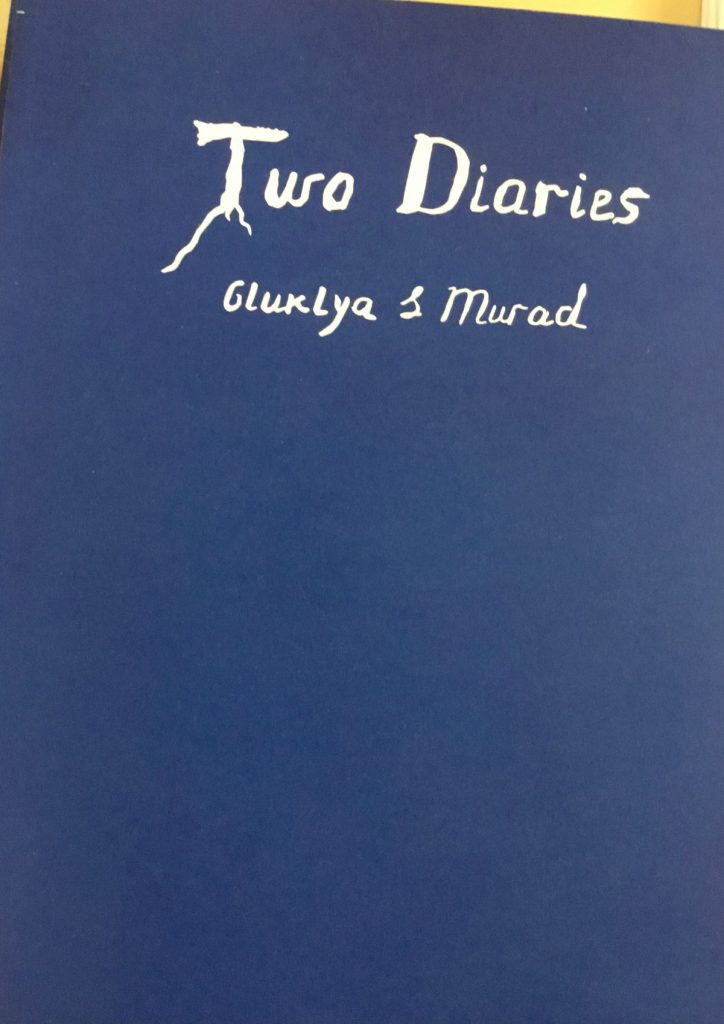Two Diaries Yurt (2nd Edition) 2025
As part of Uncertain Domesticities
Curated by Ina Bierstedt
09.04.25 – 10.08.25
House of Arts, Brno, CZ
https://www.dum-umeni.cz/en/uncertain-domesticities/t9787
Drawings from Different Series
As part of 10 x 10 duo exhibition with Floor van Keulen
10.05.2025 – 27.06.2025
Opening 10 May 16:00 – 19:00
ARTTRA Galerie, Amsterdam, NL
https://arttra.com/galerie/
Polarities and Regions Network
Start of artists’ fellowship with UKRI Economic and Social Research Council
2025 – 2026
It is continuation of the research dedicated to the lives and work of garment workers in Kyrgyzstan, Bulgaria and the Netherlands
The result of the research will be in form of a performance called “the Carnival of the Monsters” and a film about its preparation
Carnival of the Oppressed Feelings (2nd Edition)
Research residency on carnival tradition in Bulgaria
October 2025 – ongoing
The Eastern Balkans Institute of Art and Architecture, Sofia, BG
The result of the research will be shown in Christo and Jeanne-Claude Center in Gabravo in 2026
https://cjcenter.gabrovo.bg/the-center/
Travelling Version of Antigone Update (Fragment 1)
As part of STATES OF UNCERTAIN DOMESTICITIES
18.01.2025 – 15.03.2025
Haus Kunst Mitte, Berlin, DE
https://www.hauskunstmitte.de/states-of-uncertain-domesticities
Society of the Spontaneous Confessions
Research project with an open end
11.12.2024 – ongoing
Marineterrein, Amsterdam, NL
https://www.instagram.com/p/DD78edtoqxp/?igsh=MWQyMzJlb2VqcWhmaA==
Sublime is not a Beauty
Installation as part of NO FUTURE BUT POEMS
31.10.2024 — 30.11.2024
SKALA, Poznań, PL
https://galeriaskala.com/en/no-future-but-poems/
made in collaboration with GALLLERIAPIU
Gulmira Fairytales
Video screening at WAYS OF BECOMING: 25 YEARS WITH UNIDEE
21.09.2024 – 25.09.2024
Citadellarte, Biella, IT
https://www.cittadellarte.it/unidee/activity.html?id=215
Public Sharing BAU AIR residency with Gluklya and Robert Steijn
https://www.bau.amsterdam/nl/nieuws
Film Screening
03.01.2024 ● 04:30 PM
https://neubauercollegium.uchicago.edu/events/gulmiras-fairy-tales#
Sanatorium for Seamstresses
Chuikov Gallery and Library of Rescued Books
Bishkek,Kyrgyzstan
6-19 October
INTERPRETING THE HISTORY OF POLLUTION
Art Prospect & TRASH-5
Field wifes
Museum Rijswijk/NL
Installation of two parts
IMAGES OF POWER/Textile Bienalle
26 June -12 November 2023
Against the War
Museum Helmond /NL
RESILIENT REBELS
14 October -24 March 2024
Drawing Room, ( UAL) London
September 2023
The show is the result of the project: Drawing in social space, collaboration with UAL students and migrants from PACT, following the method: Utopian Unemployment Union
Selected Works
As part of THE BODY IMPLIED
16.02.2024 – 30.07.2024
Zimmerli Art Museum, New Brunswick, US
https://zimmerli.rutgers.edu/
Curated by Stephanie Dvareckas
Solo Show:
To those who have no time to play
EXHIBITION OPENING:
13 October, 19:00
ARTIST:
Gluklya (Natalia Pershina-Yakimanskaya)
SUPPORTED BY:
Ministerie van Onderwijs, Cultuur en Wetenschap; Gemeente Amsterdam; AFK; Stichting DOEN; Van Abbemuseum
IN COLLABORATION WITH:
Moawya Alkhadra
BiSCA (Saadat Aitalieva)
Shepherd Camara
Roger Cremers
Liah Frank
Natalia Grezina
Marianne Koeman
Vladimir Rannev
Benjamin Roth
Gulmira Tursunbaeva
Anna Bitkina
Shaiymkan Chylgobaeva
Kunduz Asanakunova
Anisa Ibrayeva
Nurlan Alymseitov
Dinara Akylova
Rahat Bolotbek Kyzy
Zayna Ayazbekova
Open Line Foundation
CURATOR:
Charles Esche
Framer Framed presents To those who have no time to play, the largest solo exhibition for the Amsterdam-based artist Gluklya (Natalia Pershina-Yakimanskaya), curated by Charles Esche. In keeping with her previous work, the exhibition involves many collaborators from Kyrgyz textile workers and recent migrants to the Netherlands to musicians and writers.
The exhibition is structured around four elements, each with its own unique architecture. These are two yurts, a dome, and a stage on which there will be occasional live performances. The works take us from Amsterdam to Bishkek, and via St. Petersburg back to Amsterdam again.
Although conditions in Bishkek or St. Petersburg might seem far from Dutch society, bringing these different social and emotional geographies together through art emphasises connections between them. It is impossible to ignore the many disasters looming on the horizon: the climate crisis, extreme social inequality, the war in Ukraine and the harsh working lives of people supplying cheap goods to Western high streets. Gluklya relates it all in a surreal landscape, where humour appears unexpectedly. She takes us on an associative journey through global abuses, whether they be forced labour and migration, economic exploitation or abuse of power.
CONTACT:
www.framerframed.nl
info@framerframed.nl
ADDRESS:
Oranje-Vrijstaatkade 71,
1093 KS Amsterdam
OPENING TIMES:
Tue – Sun (12:00 – 18:00)
Free Entree
The book “Two Diaries”

During my project in Bijlmerbajes, I was confronted with eye-opening questions: What does equality mean, when it is equality between a refugee and an artist, between – so to speak –trained artists and the person who did not study art at all? Can we imagine rethinking and abandoning the idea of enlightenment? How to deal with the notion of Care without falling into patronization, but soberly staying within the frame of Radical Care?
At the start of my research, I visited AZC meetings. These were some of the regular lessons provided to the refugees to teach them about the social structure of the Netherlands and what they could expect here. Nothing was said during those meetings about culture and art, let alone contemporary art. This was surprising to me. It felt as if these people were held not equal to us, westerners, as many westerners believe they cannot survive without a breath of cultural or artistic air. Another thing that struck me was the fact of placing people in the environment of a prison: bars on windows, no locks from inside the rooms, no actual privacy, and unpleasant communal places.
Being haunted by this image of Murad in the cell of the former prison, I started to think about what exactly I could do in this situation. During one of the workshops, I proposed participants write a diary, and Murad accepted this idea. I am very happy to hope that the project had a practical outcome in reality. Murad believes that work with the publishing of his Diary helped him to settle down in Amsterdam.
The book can be purchased here https://www.buchhandlung-walther-koenig.de/koenig2/index.php?mode=details&showcase=1&art=1638030
